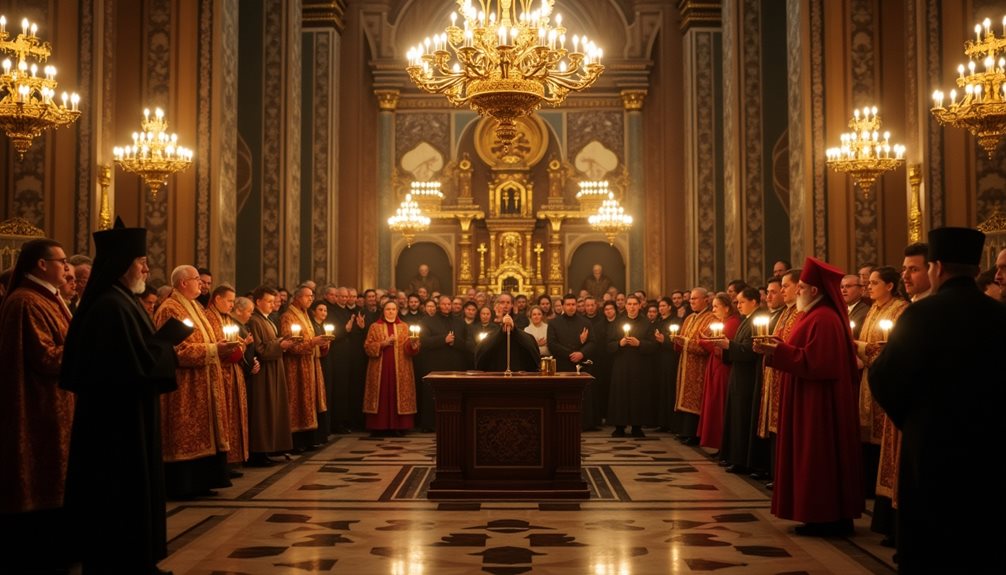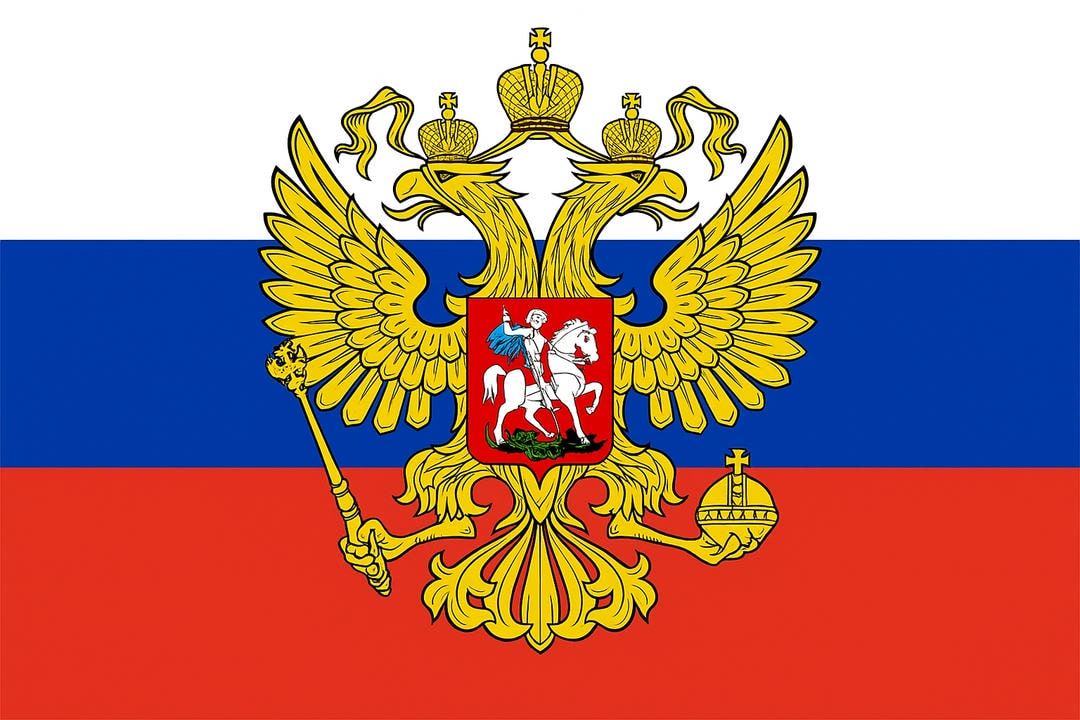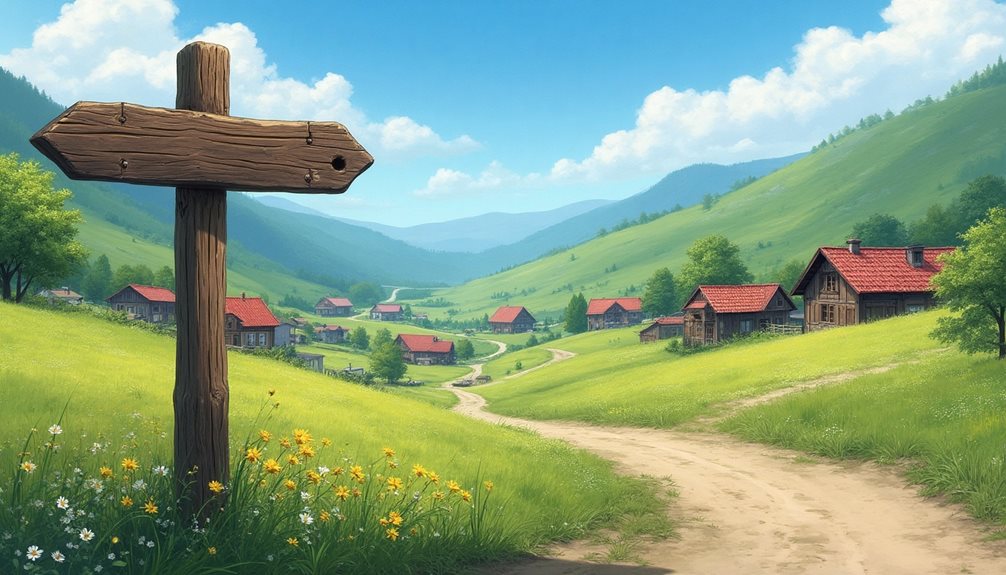Living in Russia presents a complex landscape for expatriates. Major cities like Moscow and St. Petersburg offer significant professional opportunities alongside rich cultural experiences. However, maneuvering this environment requires understanding local customs and mastering the Russian language. Expats must also consider the practical aspects of relocation, including legal assistance and integration into the community. This guide will explore essential insights for those contemplating life in this vast and intriguing country.
Introduction
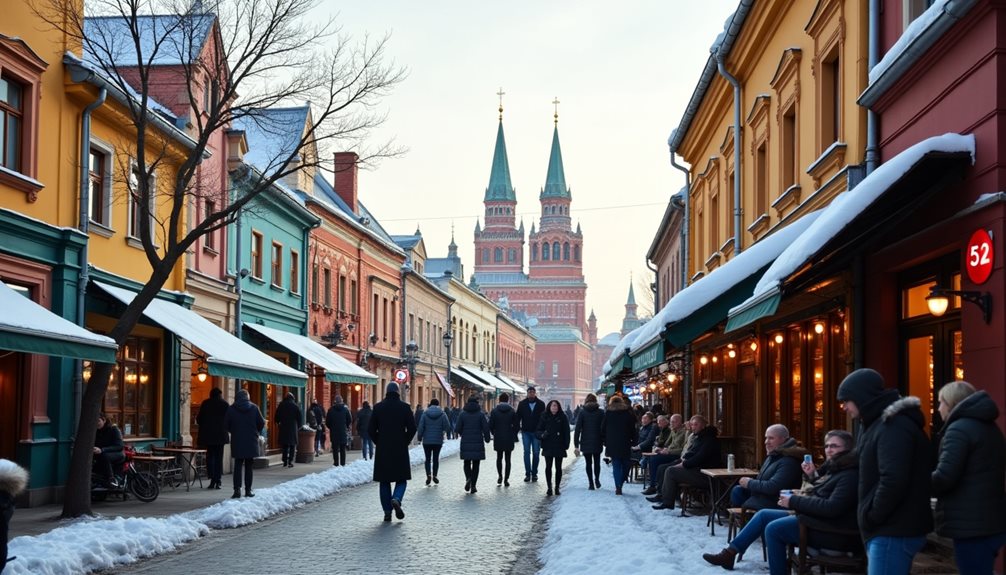
Living in Russia offers expatriates a unique blend of opportunities and challenges, immersing them in a culture steeped in history and complexity. The nation is renowned for its vibrant cultural festivals that showcase a rich heritage, while local cuisine offers diverse flavors reflecting regional variations.
Historical Landmarks and Cultural Arts
Expatriates can explore numerous historical landmarks, from the iconic Kremlin in Moscow to the Hermitage Museum in St. Petersburg, each serving as a testament to Russia’s storied past. Traditional arts, including ballet and folk music, play an essential role in the cultural landscape, with world-renowned institutions like the Bolshoi Theatre offering unparalleled performances.
Efficient Public Transportation
Efficient public transportation systems facilitate travel within major cities, allowing expats to immerse themselves in the daily life and heritage of this fascinating country. Moscow’s metro system, for instance, is not only extensive but also adorned with stunning architecture, making it a tourist attraction in its own right.
Professional Opportunities
Russia stands out as a compelling destination for expatriates seeking a blend of rich cultural experiences and professional opportunities. The country’s robust economy offers diverse career paths, particularly in major cities like Moscow and St. Petersburg.
Expat Support Networks
Expats can benefit from various support networks that facilitate integration into local communities. These networks often host cultural events, from traditional festivals to contemporary art exhibitions, enhancing social engagement and providing opportunities to connect with like-minded individuals.
Networking opportunities abound in major cities, allowing expatriates to connect with professionals across diverse industries. This not only aids in career advancement but also fosters a sense of community among expats.
Gastronomic Journey and Regional Cuisine
Local cuisine offers a unique gastronomic journey, reflecting regional diversity. From hearty Siberian dishes to the delicate flavors of Georgian cuisine, expats can indulge in a variety of culinary experiences that tell the story of Russia’s vast landscape and cultural influences.
Reasons Why Expats Choose Russia
Many expatriates are drawn to Russia due to its robust career opportunities, vibrant cultural landscape, and the chance for unique life experiences. The country’s artistic expressions, evident in its literature, theater, and visual arts, contribute to a rich cultural mosaic that is both intriguing and inspiring.
Local festivals showcase regional traditions, providing immersive experiences into traditional customs. Whether it’s celebrating Maslenitsa with blinis and festivities or attending a classical music concert, these events offer a deeper understanding of Russia’s cultural fabric.
Beyond Moscow and St. Petersburg
While Moscow and St. Petersburg serve as primary hubs for expatriates, offering unique opportunities and experiences, other regions are gaining popularity. From the picturesque landscapes of the Golden Ring cities to the vibrant cultural scene in Kazan, expats can carve out a great life in various parts of Russia, regardless of their profession or preference for rural, urban, or city life.
Nizhny Novgorod: A Blend of History and Modernity
Nizhny Novgorod, often referred to as the “third capital” of Russia, is a vibrant city that offers a blend of historical charm and modern amenities. Situated at the confluence of the Volga and Oka rivers, the city boasts stunning architecture, including the iconic Nizhny Novgorod Kremlin. The city’s rich cultural scene, bustling nightlife, and growing tech industry make it an attractive destination for expats seeking a balance between tradition and innovation.
Karelia: Nature’s Paradise
For those seeking a closer connection to nature, Karelia offers a breathtaking landscape of forests, lakes, and rivers. This region, bordering Finland, is known for its pristine natural beauty and outdoor activities such as hiking, fishing, and skiing. The capital, Petrozavodsk, provides a mix of urban conveniences and easy access to the great outdoors, making it an ideal location for nature enthusiasts.
Novosibirsk: The Heart of Siberia
Novosibirsk, the third-largest city in Russia, serves as the cultural and economic hub of Siberia. Known for its vibrant arts scene, including the renowned Novosibirsk Opera and Ballet Theatre, the city offers a rich cultural experience. Additionally, Novosibirsk is home to numerous scientific institutions and a thriving tech industry, providing ample opportunities for professionals in various fields. The city’s dynamic atmosphere and welcoming community make it an excellent choice for expats looking to experience the heart of Siberia.
Kazan: A Cultural Mosaic
Kazan, the capital of the Republic of Tatarstan, is a city where East meets West. Known for its unique blend of European and Asian influences, Kazan offers a rich cultural experience with its historic architecture, including the Kazan Kremlin, a UNESCO World Heritage site. The city’s vibrant cultural scene, diverse cuisine, and warm hospitality make it an attractive destination for expats seeking a multicultural experience.
Golden Ring Cities: Historic Charm
The Golden Ring cities, located northeast of Moscow, offer a glimpse into Russia’s medieval past. Towns like Suzdal, Vladimir, and Sergiev Posad are renowned for their historic architecture, including ancient monasteries and cathedrals. These cities provide a serene and picturesque environment, perfect for expats seeking a slower pace of life while still being within reach of major urban centers.
By exploring these diverse regions, expats can discover the rich tapestry of Russia’s cultural and natural landscapes, finding unique opportunities and experiences that suit their preferences and lifestyles.
Cultural Integration
Adapting to Russian customs and traditions can be both a rewarding and demanding journey for expatriates, as they delve into a culture rich in history, distinct social norms, and deeply rooted values. This process requires a willingness to embrace new perspectives while navigating the intricacies of a society that often operates differently from what they may be accustomed to.
Participating in cultural festivals and celebrations provides expatriates with a unique window into Russia’s vibrant heritage. These events offer more than just entertainment—they serve as immersive experiences that deepen one’s appreciation for the nation’s artistic, historical, and spiritual legacy. Similarly, exploring traditional Russian cuisine not only introduces expatriates to new flavors but also opens doors to meaningful social interactions, as shared meals are often at the heart of hospitality and community bonding in Russia.
Daily life, however, can present practical challenges, particularly when it comes to communication. The language barrier is one of the most significant hurdles expatriates face, as English proficiency among locals can be limited in many areas. This can make even routine tasks, such as grocery shopping or asking for directions, feel daunting. To overcome these obstacles, expatriates often need to employ creative communication strategies and rely on gestures, translation tools, or learning key phrases to navigate their surroundings effectively.
Many expatriates choose to immerse themselves in the language to ease this transition. This might involve engaging in structured language learning programs or seeking informal opportunities to practice conversational skills with locals. Familiarizing oneself with regional dialects and linguistic nuances can further enhance understanding and foster smoother interactions, especially when traveling outside major urban centers where accents and expressions may vary.
Despite these efforts, misunderstandings are almost inevitable when adapting to a new cultural and linguistic environment. Such moments can be frustrating but also serve as valuable learning opportunities. Patience and adaptability are crucial traits for expatriates striving to integrate into Russian society. By approaching these challenges with an open mind and a commitment to continuous learning, they can gradually build stronger connections with the local community and gain a deeper sense of belonging in their new home.
Work Opportunities for Expats
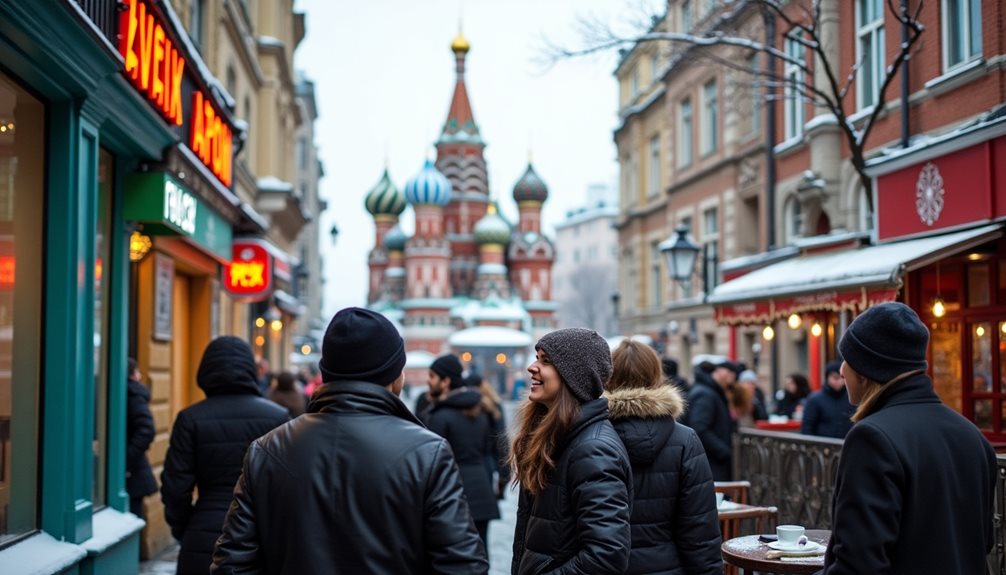 The expat job market in Russia offers a variety of opportunities, especially for individuals with specialized skills. Despite recent declines in hiring due to economic challenges, sectors such as IT, healthcare, engineering, and education continue to show growth and demand for qualified professionals. These industries provide promising avenues for expatriates seeking career stability and advancement.
The expat job market in Russia offers a variety of opportunities, especially for individuals with specialized skills. Despite recent declines in hiring due to economic challenges, sectors such as IT, healthcare, engineering, and education continue to show growth and demand for qualified professionals. These industries provide promising avenues for expatriates seeking career stability and advancement.
Networking for Career Success
Effective networking is crucial for expatriates aiming to secure employment. Joining expat communities and attending industry-specific events can help build valuable connections, opening doors to job opportunities. Platforms that connect expatriates also offer support and advice on navigating the Russian job market. Additionally, remote work options have expanded, enabling expatriates to collaborate with international companies while residing in Russia.
Key Industries for Expats
Several industries stand out as particularly attractive for expatriates due to their growth potential:
- Energy Sector: Russia’s abundant natural resources drive demand for engineers and technology experts.
- Financial Services: The expanding banking and investment landscape requires professionals skilled in fintech and regulatory compliance.
- Aerospace: Growth in design and manufacturing creates opportunities for technical specialists.
- Mining: Resource management roles are abundant, particularly in mineral extraction.
- Education: International schools and universities seek skilled educators to address staffing shortages.
Navigating Work Visas and Residency Permits
Securing work visas and residency permits can be a complex process for expatriates. Russia offers various visa types, each with specific requirements that must be carefully adhered to. Challenges such as renewal processes and compliance with local regulations can complicate long-term stays. Seeking guidance from legal professionals or local experts is often essential to ensure smooth navigation of these procedures.
Adapting to Russian Work Culture
Understanding Russian work culture is vital for workplace integration. Key aspects include:
- Discipline and Authority: A strong emphasis on hierarchy and formal structures.
- Professionalism: Conservative conduct and attire are expected in most sectors.
- Collectivism: Collaboration and group success are prioritized over individual achievements.
Fostering cultural adaptability helps expatriates thrive professionally while contributing effectively to their organizations.
Skill Development for Competitive Advantage
Continuous skill development is fundamental for success in Russia’s competitive job market. Formal education programs and vocational training centers offer opportunities to enhance technical expertise in high-demand areas such as IT, engineering, healthcare, logistics, and cybersecurity. Informal learning methods, such as language acquisition and cultural immersion, further support professional growth.
By leveraging these strategies, expatriates can position themselves effectively within Russia’s evolving job market while building meaningful connections within their industries.
Regional Living Conditions
Living conditions in Russia vary significantly by region. Urban centers like Moscow and St. Petersburg offer diverse housing options, ranging from modern apartments to historic structures, while smaller towns and rural areas often feature traditional housing styles, such as dachas. Public services like healthcare and education are generally reliable in major cities but may decline in quality in remote regions.
Transportation and Daily Life
Russia boasts well-developed transportation systems, particularly in urban hubs. Extensive metro networks and public transit ensure efficient mobility for residents. Additionally, local markets and restaurants provide access to rich regional cuisine, offering expatriates opportunities to explore traditional dishes while integrating into the community.
Cost of Living Insights
Understanding the cost of living is crucial for expatriates planning their budget. Housing costs are highest in Moscow and St. Petersburg, but smaller cities present more affordable options. Monthly expenses, including utilities and groceries, also vary by location. Negotiating rent with landlords can help reduce costs, while tracking expenses and prioritizing needs supports effective financial management.
Climate Challenges
Depending on the location, Russia’s winters can be harsh, posing challenges for expatriates unfamiliar with extreme cold. Proper winter clothing—such as insulated jackets, thermal layers, and waterproof boots—is essential for comfort. Efficient heating systems are vital for coping with the cold indoors. Outdoor activities like ice skating or skiing can help maintain physical fitness and combat seasonal depression. Embracing hearty winter foods, such as soups and stews, further enhances well-being during the dark months.
Recreational Opportunities
Despite the climate, Russia offers a vibrant array of recreational activities. Parks, theaters, museums, and cultural events foster a lively community atmosphere. These opportunities allow expatriates to engage with Russian culture while building social connections.
Adapting for Success
Thriving in Russia requires adaptability. Familiarity with local customs enhances workplace integration and fosters smoother interactions with residents. Whether through cultural immersion or skill development, expatriates who embrace the nuances of Russian life are better equipped to navigate its challenges and enjoy its unique offerings.
Tips for Thriving in Russia
Adapting to life in Russia can be a transformative experience, offering opportunities for personal growth and cultural immersion. While challenges exist, expats can thrive by embracing local customs, building meaningful connections, and exploring the country’s rich heritage.
Building a Social Network
Establishing a strong social network is essential for navigating life in Russia. Joining expat communities and attending networking events can help forge friendships and provide emotional support. Cultural exchanges with locals deepen understanding of Russian traditions, while social media platforms serve as valuable tools for discovering events and sharing experiences. By connecting with others facing similar challenges, expats can create a sense of belonging in their new environment.
Embracing Russian Culture
Immersing oneself in Russian culture enriches the expat experience. Participating in festivals and celebrations offers firsthand exposure to local traditions, while exploring regional cuisine introduces unique flavors and culinary diversity. Weekend getaways to historic cities or natural wonders like Lake Baikal allow expats to appreciate Russia’s vast landscapes and storied history. Engaging with the arts—whether through museums, theaters, or concerts—further enhances cultural integration.
Language Learning for Integration
Learning Russian is crucial for seamless integration into daily life. Familiarity with basic phrases improves communication and fosters authentic connections with locals. Language apps provide structured lessons, while practice partners or exchange groups offer real-world speaking opportunities. Understanding cultural nuances in language use, including slang, helps expats navigate social situations confidently and authentically.
Navigating Legal and Relocation Processes
Russia’s bureaucratic systems can be complex, making professional assistance invaluable for expats during relocation. Legal experts simplify visa applications, residency permits, and document processing, ensuring compliance with regulations. Relocation services also guide expats through housing searches and settling into their new environment. By seeking tailored support, expats can overcome administrative hurdles efficiently and focus on building their lives in Russia.
Adapting to Russia’s Climate
Russia’s extreme climate requires preparation, especially during its harsh winters. Insulated clothing and efficient home heating systems are essential for comfort. Outdoor activities like ice skating or skiing can help combat winter blues while promoting physical fitness. Embracing seasonal foods such as hearty soups provides warmth and nourishment during colder months. Socializing and participating in community events further support mental well-being during long winters.
Practical Tips for Thriving
- Budget Wisely: Understand regional cost variations for housing, utilities, and groceries to manage finances effectively.
- Explore Actively: Plan trips to neighboring cities or countryside destinations to experience the diversity of Russian life.
- Engage Professionally: Attend networking events to build career connections while gaining insights into local business practices.
- Stay Open-Minded: Approach cultural differences with curiosity rather than judgment to foster mutual respect.
Conclusion
Thriving as an expat in Russia requires adaptability, resilience, and a willingness to embrace new experiences. By building strong social networks, immersing in local culture, learning the language, and navigating practical challenges effectively, expats can transform their time in Russia into a rewarding journey filled with growth, discovery, and lasting memories.


